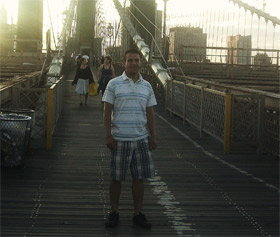News Archives - 2009
Knowing and serving our neighbors
 This summer Juventino Meza-Rodriguez has been getting to know Augsburg's neighbors, and the neighborhood, on a much deeper level than some students usually do.
This summer Juventino Meza-Rodriguez has been getting to know Augsburg's neighbors, and the neighborhood, on a much deeper level than some students usually do.
For his URGO research project, titled Augsburg College Maps and Papers, Meza-Rodriguez is exploring the relationship of the College to the Cedar-Riverside neighborhood, examining the history, growth, and present relationships. His goal is to identify best practices for colleges and universities that seek to maintain mutually beneficial relationships with their surrounding communities.
Meza-Rodriguez initially sought to determine whether Augsburg really was serving its neighbors, particularly the immigrant communities in the Cedar-Riverside area. "I have been a critic of Augsburg in this area," he said.
He chose to work with Augsburg's president, Paul Pribbenow, because of Pribbenow's expressed commitments to and understanding of the neighborhoods. "If I am being critical of what he says," Meza-Rodriguez says, "then why wouldn't I work with him so we can learn together?"
With Pribbenow, Meza-Rodriguez began by looking at Augsburg's growth over the last 140 years and how it has affected the community. He found that from the 1920s to the 60s, Augsburg was very isolated from the neighborhood, particularly when the College considered relocation. "They trained seminarians to go into the community, but not into the neighborhood," he said.
Pribbenow has drawn on his research on Jane Addams and her work with Hull House on the west side of Chicago to assist Meza-Rodriguez in his project. He's helped Meza-Rodriguez understand that knowing our neighbors helps us serve them, or work with them, in the most appropriate and beneficial ways. "We are trying to define where we haven't known our neighbor well and to see where we haven't been as effective or where we said, ‘We know best,'" Pribbenow said.
In early July, Meza-Rodriguez traveled to New York to visit Wagner College on Staten Island. There he met with people who have developed Wagner's reputation of playing an active role in the community.
"The most impressive, or most evident, is the way departments partner with organizations in the community through courses and community-identified projects. This benefits both the students and the community," he says.
He also spent time at University of Pennsylvania where he says, much of the university's outreach work is being done in area schools. The schools are used as community centers where students and members of the broader community can benefit from the various programs in place.
At Wagner and U Penn, Meza-Rodriguez says the community helps identify where resources from the schools can be applied. He also noted that the most committed faculty and staff at both schools had the strongest connections to the community and were committed to continuing their work.
"At Augsburg, I have noticed that pattern, too," he says.
"The underlying goal of all institutions is education, and a better and healthier community," Meza-Rodriguez says. "There is also the theme of mutual benefit—where I don't go into a community and say, 'This is what you need.' Rather, I have the privilege of offering some of my resources for the benefit of the community, and in the case of institutions, for the benefit of students as well."